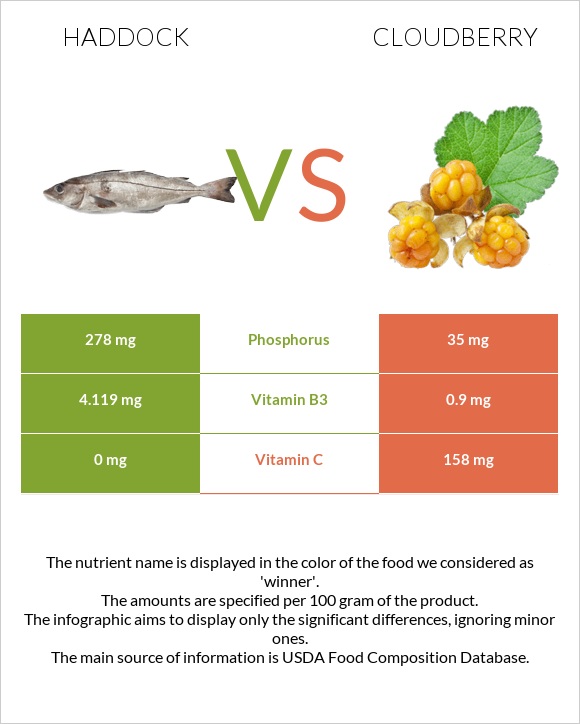Haddock vs. Cloudberry — In-Depth Nutrition Comparison
Compare
Differences between haddock and cloudberries
- Haddock has more phosphorus and vitamin B3, while cloudberries have more vitamin C and iron.
- Cloudberries' daily need coverage for vitamin C is 176% higher.
- Cloudberries contain 8 times less phosphorus than haddock. Haddock contains 278mg of phosphorus, while cloudberries contain 35mg.
- Haddock has a lower glycemic index. The glycemic index of haddock is 0, while the glycemic index of cloudberries is 44.
The food types used in this comparison are Fish, haddock, cooked, dry heat and Cloudberries, raw (Alaska Native).
Infographic

Infographic link
Mineral Comparison
Mineral comparison score is based on the number of minerals by which one or the other food is richer. The "coverage" charts below show how much of the daily needs can be covered by 300 grams of the food.
| Contains more MagnesiumMagnesium | +∞% |
| Contains more PotassiumPotassium | +∞% |
| Contains more CopperCopper | +∞% |
| Contains more ZincZinc | +∞% |
| Contains more PhosphorusPhosphorus | +694.3% |
| Contains more ManganeseManganese | +∞% |
| Contains more SeleniumSelenium | +∞% |
| Contains more CalciumCalcium | +28.6% |
| Contains more IronIron | +233.3% |
Vitamin Comparison
Vitamin comparison score is based on the number of vitamins by which one or the other food is richer. The "coverage" charts below show how much of the daily needs can be covered by 300 grams of the food.
| Contains more Vitamin AVitamin A | +∞% |
| Contains more Vitamin EVitamin E | +∞% |
| Contains more Vitamin DVitamin D | +∞% |
| Contains more Vitamin B3Vitamin B3 | +357.7% |
| Contains more Vitamin B5Vitamin B5 | +∞% |
| Contains more Vitamin B6Vitamin B6 | +∞% |
| Contains more Vitamin B12Vitamin B12 | +∞% |
| Contains more Vitamin KVitamin K | +∞% |
| Contains more FolateFolate | +∞% |
| Contains more Vitamin CVitamin C | +∞% |
| Contains more Vitamin B1Vitamin B1 | +117.4% |
All nutrients comparison - raw data values
| Nutrient |  |
 |
DV% diff. |
| Vitamin C | 0mg | 158mg | 176% |
| Vitamin B12 | 2.13µg | 89% | |
| Selenium | 31.7µg | 58% | |
| Protein | 19.99g | 2.4g | 35% |
| Phosphorus | 278mg | 35mg | 35% |
| Vitamin B6 | 0.327mg | 25% | |
| Cholesterol | 66mg | 22% | |
| Vitamin B3 | 4.119mg | 0.9mg | 20% |
| Choline | 79.6mg | 14% | |
| Sodium | 261mg | 11% | |
| Potassium | 351mg | 10% | |
| Vitamin B5 | 0.494mg | 10% | |
| Magnesium | 26mg | 6% | |
| Iron | 0.21mg | 0.7mg | 6% |
| Zinc | 0.4mg | 4% | |
| Vitamin E | 0.55mg | 4% | |
| Carbs | 0g | 8.6g | 3% |
| Vitamin D | 23 IU | 3% | |
| Copper | 0.026mg | 3% | |
| Vitamin D | 0.6µg | 3% | |
| Folate | 13µg | 3% | |
| Calories | 90kcal | 51kcal | 2% |
| Vitamin A | 21µg | 2% | |
| Vitamin B1 | 0.023mg | 0.05mg | 2% |
| Manganese | 0.013mg | 1% | |
| Saturated fat | 0.111g | 1% | |
| Polyunsaturated fat | 0.204g | 1% | |
| Fats | 0.55g | 0.8g | 0% |
| Net carbs | 0g | 8.6g | N/A |
| Calcium | 14mg | 18mg | 0% |
| Vitamin B2 | 0.069mg | 0.07mg | 0% |
| Vitamin K | 0.1µg | 0% | |
| Trans fat | 0.005g | N/A | |
| Monounsaturated fat | 0.074g | 0% | |
| Tryptophan | 0.26mg | 0% | |
| Threonine | 1.015mg | 0% | |
| Isoleucine | 1.067mg | 0% | |
| Leucine | 1.882mg | 0% | |
| Lysine | 2.126mg | 0% | |
| Methionine | 0.686mg | 0% | |
| Phenylalanine | 0.904mg | 0% | |
| Valine | 1.193mg | 0% | |
| Histidine | 0.682mg | 0% | |
| Omega-3 - EPA | 0.051g | N/A | |
| Omega-3 - DHA | 0.109g | N/A | |
| Omega-3 - DPA | 0.006g | N/A | |
| Omega-6 - Eicosadienoic acid | 0.001g | N/A |
Macronutrient Comparison
Macronutrient breakdown side-by-side comparison
Protein:
19.99 g
Fats:
0.55 g
Carbs:
0 g
Water:
79.65 g
Other:
0 g
Protein:
2.4 g
Fats:
0.8 g
Carbs:
8.6 g
Water:
87 g
Other:
1.2 g
| Contains more ProteinProtein | +732.9% |
| Contains more FatsFats | +45.5% |
| Contains more CarbsCarbs | +∞% |
| Contains more OtherOther | +∞% |
~equal in
Water
~87g





